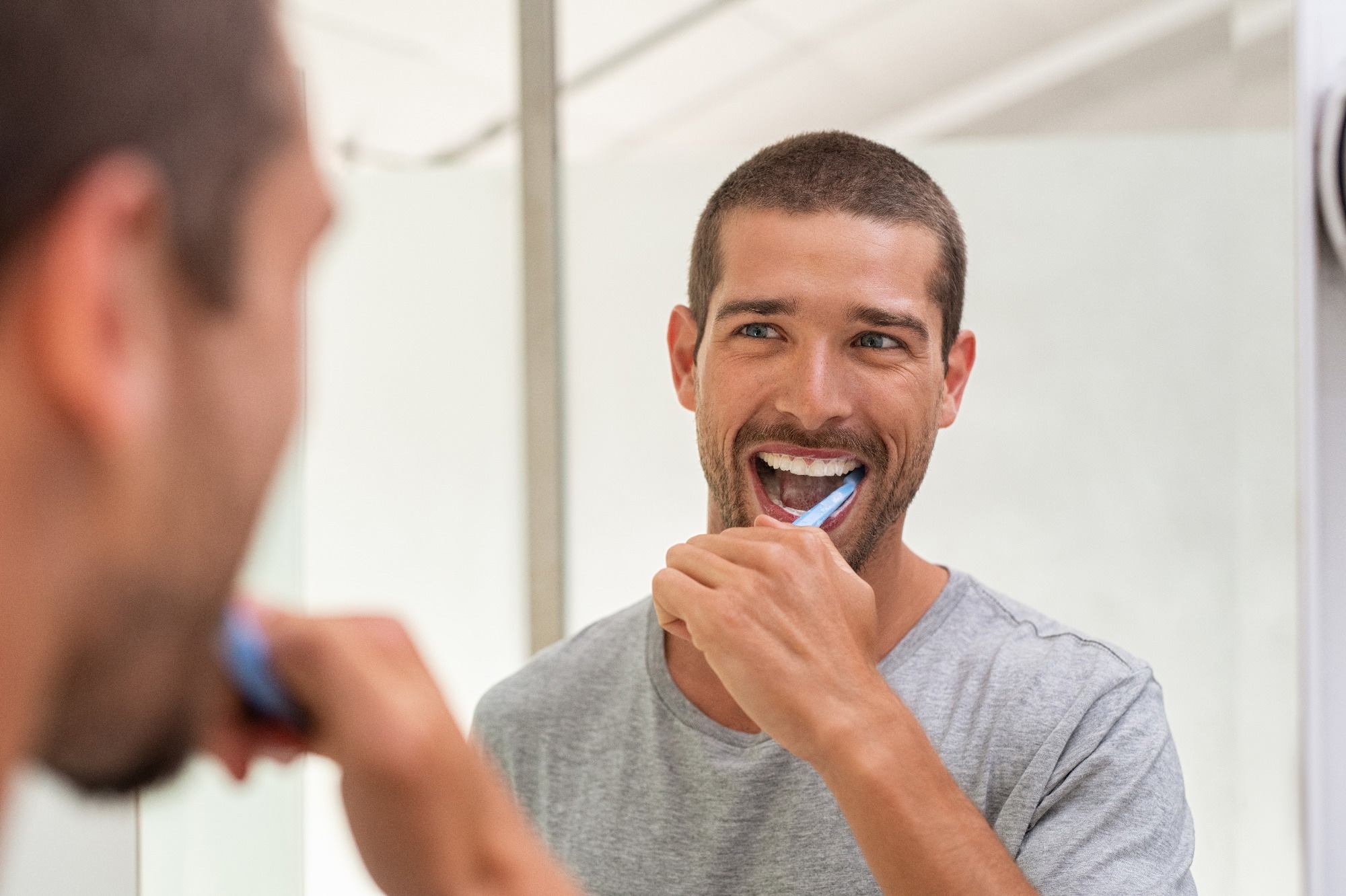In a recent study published in Scientific Reports, researchers determined whether the frequency of brushing one’s teeth increases the risk of cardiovascular diseases (CVDs) in patients aged 20 years or older.
Study: Not brushing teeth at night may increase the risk of cardiovascular disease. Image Credit: Ground Picture / Shtuterstock.com
Background
Several previous studies have emphasized the importance of perioperative oral care and management in patients with malignant cancers, as well as respiratory, gastrointestinal, and cardiovascular diseases.
Many of these reports have focused on the time of tooth brushing in the context of demineralization of the teeth. However, these reports did not explore the relationship between toothbrush time and systemic diseases, including CVD.
About the study
The individuals included in this study were hospitalized at the Osaka University Hospital in Japan between April 2013 and March 2016 for examination, surgery, or treatment. Patients who visited the hospital’s Unit of Dentistry to seek dental treatment, perioperative oral care, and screening for infection were also considered for the analysis.
Taken together, the 1,675 study participants were classified into four groups. Group MN reported brushing their teeth twice daily, once after waking up and again at night, whereas group Night reported brushing their teeth only once at night. Group M reported brushing their teeth only after waking up, whereas group None did not brush their teeth.
The number of participants in each group was 409, 751, 164, and 259, respectively. The number of men in group M was four times that of women in this group.
Groups Night and MN had the highest percentage of individuals who reported brushing their teeth after lunch at 44.9% and 24%, respectively. Few study participants in groups M and None reported brushing their teeth after lunch.
The researchers evaluated each participant’s age, gender, smoking history, and follow-up results. In addition, four independent investigators retrospectively reviewed the dental and medical records of all study participants.
One dentist investigated oral health, pre-hospitalization frequency and time of toothbrushing, the depth of periodontal pockets, the extent of tooth mobility, and teeth count.
Several cardiovascular events were considered in the study, which included CVD-related hospitalization for heart failure, arrhythmia, myocardial infarction, angina pectoris, and valvular and aortic diseases requiring surgery.
A proportional hazards model was used to assess the association between the observation items and the occurrence of cardiovascular events and life prognosis. For subgroup analysis stratified by smoking status, Kaplan-Meier curves were used to estimate the time from the participants’ dentistry visit to study endpoints of death or the end of the study period. All statistical analyses considered P-values less than 0.05 as significant.
Study findings
Based on blood samples obtained at hospital admission, all participants had similar C-reactive protein (CRP), hemoglobin, albumin, creatinine, and HbA1c levels but different brain natriuretic peptide (BNP) levels. Groups MN and Night had significantly higher survival rates as compared to Group None.
All study participants had similar smoking statuses; however, they had varying dental parameters. For example, group MN had the most participants with dental pocket depths exceeding eight millimeters (mm). As compared to groups Night and M, more patients in groups None and MN had a dental mobility index of three.
In their clinical practice, the researchers encountered many middle-aged and older people who did not brush their teeth at night. In their interviews, many of these patients mentioned they consumed alcohol at night, which caused them to become too tired and not brush their teeth.
In each study group, several individuals reported not brushing their teeth at night. This may be due to habits learned from their parents during childhood, lifestyle, and regional variations. General disinterest in dental hygiene is another reason people do not brush their teeth at night and after lunch.
Breakfast and lunch have been shown to increase the risk of intraoral deposits that remain in the mouth throughout the day and, as a result, increase the risk of dental caries and other periodontal diseases. Thus, brushing only in the morning after waking up is insufficient and implies poor oral hygiene. Furthermore, brushing one’s teeth at night is crucial to maintain good oral health, which supports the hypothesis that intraoral bacterial load surges during sleep due to reduced salivary flow.
Conclusions
The study findings reiterate that while brushing teeth before breakfast is necessary, brushing teeth at night before going to bed is even more important to prevent CVDs.
Journal reference:
- Isomura, E.T., Suna, S., Kurakami, H. et al. (2023). Not brushing teeth at night may increase the risk of cardiovascular disease. Scientific Reports 13(10467). doi:10.1038/s41598-023-37738-1
